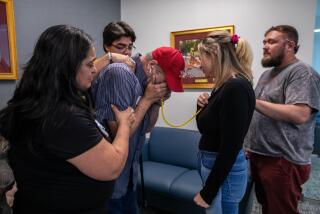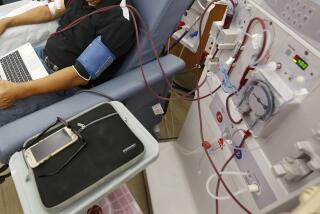New Rules Seek to Make Organ Transplants Fair
- Share via
PITTSBURGH — They have the same disease, need the same transplant and know the frustrations of the same three-year wait, yet Frank Rowe questions a new national system for allocating precious organs and Terri Patrizio does not.
The two, who need healthy hearts and lungs, and thousands who need other organs, have no choice but to wait, their futures on hold and their lives on the line.
“My wife has the best line. She says she wishes I could wear myself inside out so people could see the physiology of my problem,” said Rowe, 37, an industrial psychologist from Philadelphia who appears robust but is dying.
Prefers Waiting
“For me, I’d rather wait as long as I can,” said Patrizio, 24, of nearby Plum, who is seeking a degree in business management. “I’m glad they won’t do it until I really need it.”
The two suffer from primary pulmonary hypertension, a condition in which the blood flow from the right side of the heart to the lungs is restricted by increased blood pressure in the lungs, eventually causing congestive heart failure. Victims can feel and look fine for years then sink within weeks, the fate of Patrizio’s brother, Bob, who died in 1984 at age 33.
With medical urgency a key criterion in the scoring system that became mandatory Oct. 1, Rowe is worried. He says he is not sick enough yet to get a heart-lung transplant under that standard. But once he is, he may be too weak to endure the grueling surgery, assuming that organs suitable for his 6-foot-2, 212-pound frame can be found quickly.
A record 45 heart-lung transplants were performed last year in the United States, according to Arthur Harrell of the American Council on Transplantation. But about 75 people are awaiting the procedure at any one time.
“In the main, I support a system,” said Rowe, who moved to Pittsburgh in October, 1984, to be closer to Presbyterian-University Hospital. “It’s better than no system at all, better than helter-skelter.”
“It’s fairer,” Patrizio said. “I have trust.”
According to the new rules, the nation’s approximately 200 transplant centers, 110 organ procurement agencies and innumerable tissue-typing laboratories must participate in the national Organ Procurement and Transplantation Network or risk losing federal Medicare reimbursements.
Under the network, members must use a standardized scoring system for distributing donated organs. Taken into account, along with medical urgency, are length of time on the waiting list, the patient’s proximity to the organs, and quality of the match.
The hope, experts say, is that patients’ families will no longer feel they need publicity or White House attention to improve their chances for a transplant. In the past, such special notice has brought criticism.
Basis for Immunity
Network members also must share among themselves the 5% of donated kidneys considered near perfect matches. These are the ones having all six antigens, the substances that induce creation of antibodies and together form the basis for immunity.
“The most important benefit, the biggest dividend . . . is elimination or diminution of the waste of organs,” said Dr. Thomas E. Starzl, the University of Pittsburgh transplant pioneer who helped devise the point system.
The system was approved last summer by the board of directors of the Virginia-based United Network for Organ Sharing, which received a federal contract in 1986 to establish the national transplant network, guidelines for distributing organs and a computerized data bank.
“It’s consensus by people who have to do the work and have to worry about the resources,” Surgeon General C. Everett Koop said at the recent International Organ Transplant Forum in Pittsburgh.
With 11,000 people awaiting kidney transplants nationwide and 825 or so awaiting other organs, most experts support such a system, according to Dr. John McDonald, president of both the organ-sharing network and the American Society of Transplant Surgeons. Many transplant centers, in fact, already have been “more or less doing it all along in a less than conscious way,” he said.
“It’s more a matter of putting some consistency into the situation and providing the public with the information of how matters are carried out,” he said.
Still, some experts agree with patient Rowe that flexibility is needed.
“I’m a little fearful we’re going to inevitably end up with a kind of Internal Revenue Service,” said Dr. Paul Russell of Harvard University.
Such a stringent system would be unnecessary if more organs were donated to meet the increasing demand, due largely to transplantation’s ever-growing success, according to Dr. Robert J. Corry of the University of Iowa.
Only about 20% of potential organ donors, usually brain-dead patients, actually become donors, Corry said. The families of 10% decline, leaving 70% whose families are never approached.
Corry and others hope that will change with a new federal law, which also took effect Oct. 1, requiring hospitals to establish some protocol for approaching patients’ families about organ donation. Forty-one states plus the District of Columbia already have such a measure.
For whatever reason, many hospitals have been slow in implementing such a program, according to Ross Anthony, associate administrator of program development for the Health Care Financing Administration. The agency, part of the U.S. Department of Health and Human Services, runs Medicare and therefore must monitor compliance with the new scoring system and required request law.
“We have no desire to cut hospitals off the system and cause a massive problem,” Anthony said. “On the other hand . . . we have to implement the law, and the law is the law.”
Americans appear inclined to donate organs, according to a recent Gallup Poll. Thirty percent of those surveyed who were aware of transplantation said they were “very likely” to want their organs donated after death. Sixty-six percent said they would be “very likely” to donate a loved one’s organs if that person had made such a request. Forty-three percent said they would be “very likely” to donate their child’s organs.
Meanwhile, the Health Care Financing Administration is deciding which heart transplant centers should be reimbursed for the procedures. Qualifying institutions must have performed at least 36 heart transplants, including 12 in each of the two years prior to applying, and must have a patient survival rate of 73% a year after the operation and 65% two years afterward.
More to Read
Sign up for Essential California
The most important California stories and recommendations in your inbox every morning.
You may occasionally receive promotional content from the Los Angeles Times.










